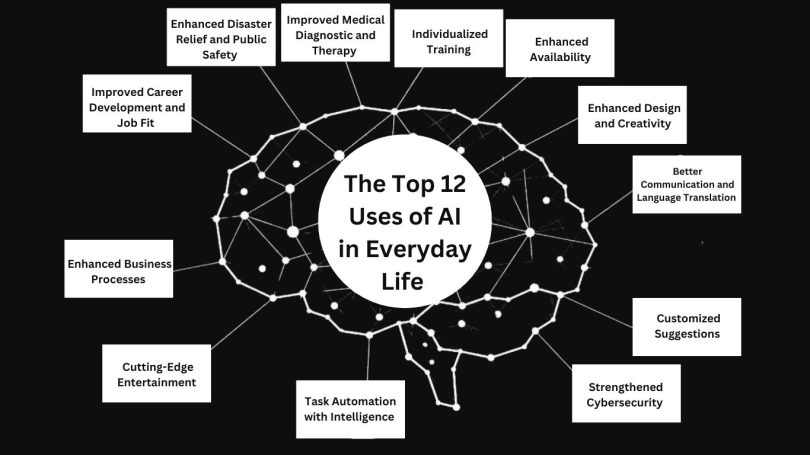From a science fiction concept, artificial intelligence (AI) has evolved to become an essential part of contemporary life. Its impact extends to many industries, improving systems, goods, and services that we use on a daily basis. Artificial intelligence (AI) has the potential to significantly benefit a wide range of businesses thanks to the rise in data generation, sophisticated algorithms, and computer capacity. McKinsey estimates that by 2030, artificial intelligence (AI) will have tripled its global penetration from 2015 to 2021 and will have contributed more than $13 trillion to the world economy. Our everyday experiences from banking and shopping to learning, working, and communicating are enhanced by the widespread deployment of AI.
The following list of 12 inventive ways AI is changing our daily life is
1. Improved Medical Diagnostic and Therapy
AI transforms healthcare by enhancing patient outcomes and diagnostic precision. Artificial intelligence (AI) finds patterns in large datasets that human therapists would overlook. For example, AI imaging tools can analyze CT, MRI, and X-ray images to help physicians diagnose patients more quickly and accurately. Basic medical advice is provided via AI-driven chatbots, increasing the effectiveness and accessibility of healthcare.
2. Individualized Training
AI allows for individualized, self-paced learning, which changes education. AI tutors evaluate a student’s learning styles, areas of strength, and shortcomings before modifying their teaching methods. Intelligent coaching is made possible by technologies like Carnegie Learning and Century Tech, and students’ learning experiences are improved by AI grading tools that provide immediate feedback.
3. Enhanced Disaster Relief and Public Safety
AI improves public safety by optimizing resource allocation and expediting emergency response times. While artificial intelligence (AI) uses data analysis to prioritize emergency response operations during natural disasters, ShotSpotter is a technology that detects gunshots in real-time. Artificial intelligence (AI) surveillance systems help law enforcement discover threats, but ethical issues need to be taken into account.
4. Enhanced Availability
AI improves the accessibility of everyday chores for individuals with disabilities. For blind users, AI visual aids provide context, while voice recognition technology enables hands-free gadget use. The visually challenged can be more independent thanks to apps like Be My Eyes, which provide real-time visual aid.
5. Enhanced Design and Creativity
AI democratizes creativity by enabling everyone to produce music, films, graphics, and logos of industry-standard quality. Simple-to-use templates are provided by Canva and Designs.ai, while AI tools for music composition provide unique tunes. AI-powered design tools enable users to express their creativity to unprecedented heights.
6. Better Communication and Language Translation
Language barriers are eliminated by AI through real-time translation services like Google Translate. These tools are always learning from fresh data, which increases their accuracy in regional settings and dialects. Future developments might make multi-party voice communication across languages possible in real-time, promoting international cooperation and understanding.
7. Improved Career Development and Job Fit
AI finds relevant openings by evaluating resumes and skills, which expedites the job matching process. Artificial intelligence (AI) is used by job-matching platforms such as ZipRecruiter and LinkedIn, and by AI career coaches to provide individualized career development and transition advice.
8. Enhanced Business Processes
Through data analysis, artificial intelligence (AI) enhances supply chains, logistics, and inventory control. Retail platforms such as Celect forecast local product demand, assisting companies in optimizing resource allocation to cut down on waste and improve consumer happiness.
9. Customized Suggestions
Personalized suggestions powered by AI increase user engagement in apps such as Spotify, YouTube, and TikTok. AI fashion assistants like Muse provide personalized outfit recommendations, enhancing the shopping experience and influencing more informed selections.
10. Strengthened Cybersecurity
Artificial intelligence (AI) improves cybersecurity by seeing trends in massive datasets, recognizing novel forms of malware, phishing scams, and fraud. AI is used by banks to identify fraudulent transactions instantly, preventing identity theft and financial damage for its clients.
11. Task Automation with Intelligence
AI increases efficiency by automating repetitive jobs. Intelligent bots can manage emails, plan flights, and schedule meetings, saving up time for more important tasks. By offering context-aware corrections and suggestions, artificial intelligence (AI) writing aides such as Grammarly and Jasper enhance communication.
12. Cutting-Edge Entertainment
AI improves entertainment by generating immersive video game, movie, and music experiences. Artificial intelligence (AI) algorithms customize content recommendations, while AI-generated music and art are pushing creative boundaries. Artificial intelligence (AI) enhances virtual reality (VR) and augmented reality (AR) experiences, making them more dynamic and captivating.
Our everyday lives are incorporating artificial intelligence more and more. It is transforming how we work, play, and live and has many benefits. The potential of AI technology to improve many facets of life will only increase as it develops, making it an essential tool in today’s environment.








